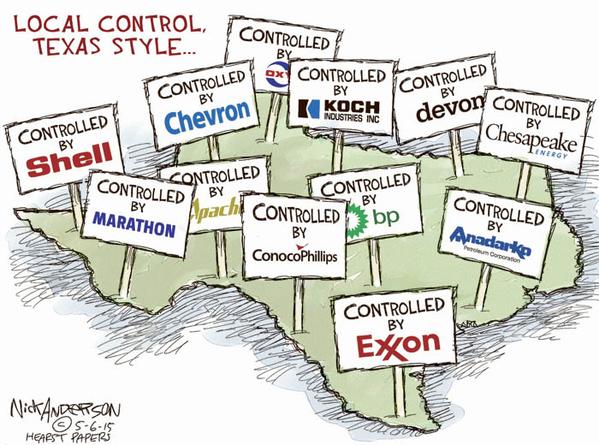
Texan communities statewide are planning how to restore local democratic control over fracking. They have to because the oil and gas industry, aided and abetted by the state legislature and Governor Abbott with the passage of HB40, stripped communities’ century old rights to govern oil and gas development concurrently with the state.
In the meantime, cities should consider using the “safe harbor” clause of HB40 to hoist frackers on their own petard.
Cities interested in updating their drilling ordinances should think about the HB40 safe harbor clause.
An ordinance or other measure is considered prima facie to be commercially reasonable if the ordinance or other measure has been in effect for at least five years and has allowed the oil and gas operations at issue to continue during that period.
Drew Darby established legislative intent with some vehement statements about the HB40 safe harbor clause. Those statements are public record. Below are two news reports about the intent of the safe harbor clause.
- Darby also added what he calls a “safe harbor” provision, protecting cities from legal challenges if their ordinances have not triggered litigation in the past five years – another change that the Municipal League found more palatable. Texas Tribune
- To provide some comfort to cities with long-standing ordinances, the bill contains a “safe harbor” provision that says any ordinance or other measure in effect for five years that has allowed drilling to take place should be considered commercially reasonable on its face. Star-Telegram
The industry, through our legislators, made it obvious that they desire a setback of 600’ or less. But there is at least one ordinance with a 1000’ setback that meets the HB40 safe harbor clause.
Dish, Texas passed their ordinance in March 2006. It has a 1000’ setback and operators have complied with the ordinance, making the Dish ordinance commercially reasonable under HB40.
The Town of Dish has amended the ordinance several times to strengthen parts of it including noise and noxious odors. They added a vapor recovery unit requirement ordinance 5 years ago this past May.
There may be other five year old ordinances that have allowed drilling in the city limits with specific ordinances parts from which cities can pick and choose.
Adopting pieces of ordinances that comply with the HB40 safe harbor clause, puts cities in a good position to defend industry challenges against the new ordinance under HB40.
While 1000’ isn’t perfect, hell, it’s not even protective, it’s better than the 600’ feet embraced by industry.
Meanwhile, the fight to restore real local control continues.
Update from Calvin Tillman, former mayor of Dish:
The original ordinance with the 1000 ft setback was adopted in 2006. In 2008 or 2009 Devon drilled 3 wells in compliance with the ordinance, and the 1,000 ft setback. There was another revision to the ordinance in 2008, but I can’t remember what the change was. In 2010 we updated the ordinance requiring vapor recovery, but I don’t believe any drilling has taken place in the town limits since then.
Calvin Tillman
About Sharon Wilson
Sharon Wilson is considered a leading citizen expert on the impacts of shale oil and gas extraction. She is the go-to person whether it’s top EPA officials from D.C., national and international news networks, or residents facing the shock of eminent domain and the devastating environmental effects of natural gas development in their backyards.
- Web |
- More Posts(5121)

Got Questions on HB 40? The City of Arlington organized a meeting for Saturday, August 1 at 9:00am – 12:00pm at the
Arlington Convention Center
1200 Ballpark Way, Arlington, Texas 76011
There will be speakers from the Railroad Commission in Austin, the Texas Commission for Environmental Quality(TCEQ) and EPA. There will be an opportunity to submit questions to the assembled officials in writingHere is an e-invite link from ‘Liveable Arlington’, a grassroots group whose name reflects their goal……https://www.facebook.com/events/1470595673236677/
Somehow, I doubt you will get any straight answers from that crew. LOL!
In Texas, don’t spend much money for a quality of life homestead. If you need to work here, live in a trailer or a shack. When the job dries up, go back home away from Texas. Also, BTW, don’t expect any help from the RRC or the TCEQ in the above noted meeting–they are both bought-off organizations.
I guess I’ll be a renter as long as I live in Texas. I don’t like renting but I can’t take another financial hit like the one I took on my property value in Wise County.